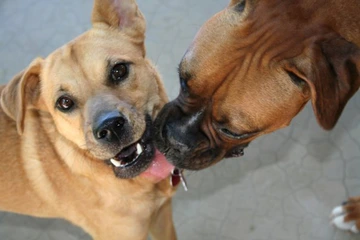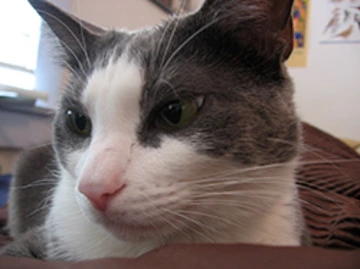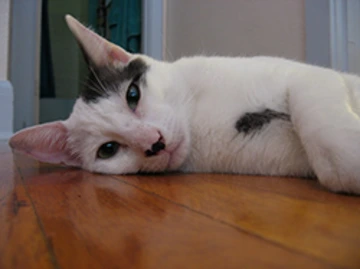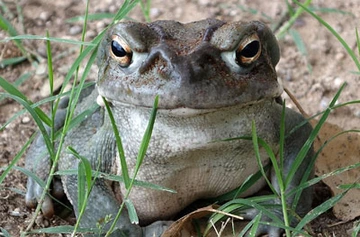The Arizona Poison Control and Drug Information Center receives approximately 1,200 calls regarding poisonings in pets every year.

Pet poisonings occur in many ways; the most common are the ingestion of medications, foods, plants and toxins, and encounters with poisonous animals. Many pet poisonings can be avoided through some simple precautions. This site addresses dangerous situations for dogs and cats, the most common pets in the United States.
Where to Call for Help
Some fees may apply.
This center is staffed with veterinary health professionals who are familiar with how different species respond to poisons and with treatment protocols. They have a wide range of information specific to animal poisoning.
Prevention

Pets have different reactions than humans to many common substances--but also are endangered by many of the same products and substances that can harm humans. Here are tips to protect your pets.
- Discard empty containers safely in a place where your pet will not play with them.
- Antifreeze is especially dangerous as it tastes sweet, and even a small amount can be fatal. Always clean up spills.
- Always check with your vet before you give your pet any medicine for pain.
- Know what plants are in your house. Many young pets play with house plants and may eat them. Unfortunately many house plants are poisonous and you may want to remove or secure plants that are especially dangerous. Any plant treated with an insecticide is treated with a substance that may be poisonous to the pet.
- Flea and tick sprays, shampoos, collars and dusts contain insecticides and should be used cautiously. If your pet becomes confused or does not act normally, discontinue the use of the product, rinse the animal well in clean water and call your veterinarian.
- Many poisons made to kill mice or rats smell and or taste good to pets. Always place these products where your pet cannot get to them. If they are poisonous to mice, they are probably poisonous to your pet.
- Pets will chew on almost anything. Give them safe pet toys to chew and play with. This not only helps to entertain us and the pet but also keeps them busy so they don't chew on toxic plants or other things they should not have.
- Do not allow or encourage your pet to drink alcohol, which may have very dangerous effects.
Pets chew poisonous plants
Many plants found in and around the house are dangerous to pets that play with or eat them. Refer to the Plants section for information about identifying potentially harmful plants.
- Remove any plant parts remaining in the mouth and attempt to rinse around the mouth with water. Do not use a forceful stream from the hose directed at the back of the mouth as you may force water into the animal's lungs. Allow the animal to drink a small amount of water (one glass).
- Identify the plant your pet ate.
- Call the poison center or veterinarian.
- Always take the suspected plant or remaining parts of the plant with you if going to the veterinarian's office or an emergency clinic.
- Never try to make your pet vomit.
Dangerous foods

Many foods that are fine for people are not safe for dogs.
- Raisins and grapes can cause vomiting, diarrhea and kidney failure in dogs; the minimum amount that is safe is unknown, so keep these foods away from your pet.
- Chocolate is toxic to canines; the darker the chocolate, the more harmful. Eating chocolate can cause a dog to experience excitement, increased urination, muscle tremor seizures and rapid heart rate.
- Sugarless gums and candies with the sugar alcohol called xylitol can cause a rapid drop in your dog's blood sugar.
- Onions have a chemical that damages blood cells and can cause anemia in dogs. Even one small whole onion can cause death.
- Macadamia nuts have a compound that can temporarily paralyze a dog's hind legs. The dog will recover with no treatment and no long-term effects.
More about medications
Pets do not react to medications the same as humans. Trying to adjust the amount of medicine to give a pet based on the amount to give to a child or adult normally does not work and may result in the death of a loved pet or needless suffering due to a drug that does not work. It is very important to ask a veterinarian about which medicines can safely be given to a pet.
Poisonous toads

The Colorado River toad, also known as the Sonoran Desert toad, found in Arizona, is toxic to dogs when they lick or swallow it. Your pet may also suffer if a toad sits in the dog's drinking water for a long enough period. The poison in the toad's skin may produce effects ranging from severe discomfort to paralysis and death.
If your dog has come in contact with this toad:
- If the toxin touches the dog's eyes or inside of the mouth, flush the affected area with running water.
- In the mouth, run the water from one side of the outside of the mouth to the other side. This allows the toxic rinse water to run out of the mouth instead of down your dog's throat.
- Take your dog to a veterinarian if there are unusual symptoms or the dog has eaten the toad.

